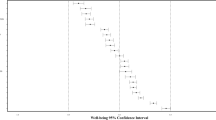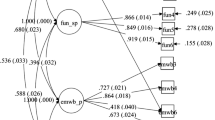Abstract
Between-nation differences in wellbeing are frequently reported. Such differences are attributed to between-nation differences in social, economic and political factors. However, there is a likelihood that between-nation differences are over-estimated as they fail to account for the extent to which wellbeing varies within-nation owing to within-nation factors. Participant data for 43,000 participants from 23 countries was obtained from wave 3 of the European Social Survey in 2006. Analyses were undertaken in a multi-level framework with citizens nested within-nation in order to derive maximum likelihood estimates and standard error which adjust for the nested data hierarchy. Participant data was adjusted for (1) a design weight which adjusted for a sampling probability reflecting their likelihood of being recruited for the study, and (2) a population weight which adjusts for the extent individuals reflected a nation’s population. Across wellbeing indicators, most variance was accounted for at the within-nation level (> 95%). Within-nation factors were the strongest drivers of wellbeing. Best linear unbiased predictions indicated that raw national aggregated well-being means over-estimate between-nation wellbeing differences. Many prior cross-national wellbeing comparisons likely overestimate between-nation differences as they fail to account for the nested data structure in which individual citizens are nested within countries. Between-nation factors were not substantive drivers of wellbeing outcomes in comparison with within-nation effects and interpretation of any between-nation effects need to be carefully considered since so little wellbeing variance is accounted for at the between-nation level.

Similar content being viewed by others
References
Alesina, A., Di Tella, R., & MacCulloch, R. (2004). Inequality and happiness: Are Europeans and Americans different? Journal of Public Economics, 88, 2009–2042.
Arthaud-Day, M. L., & Near, J. P. (2005). The wealth of nations and the happiness of nations: Why “accounting” matters. Social Indicators Research, 74, 511–548.
Ballas, D., & Tranmer, M. (2012). Happy people or happy places? A multilevel modeling approach to the analysis of happiness and well-being. International Regional Science Review, 35, 70–102.
Berg, M., & Veenhoven, R. (2010). Income inequality and happiness in 119 nations. In B. Greve (Ed.), Happiness and social policy in Europe (pp. 174–194). Cheltenham: Edward Elgar.
Bleidorn, W., Arslan, R. C., Denissen, J. J., Rentfrow, P. J., Gebauer, J. E., Potter, J., et al. (2016). Age and gender differences in self-esteem—A cross-cultural window. Journal of Personality, 111, 396–410.
Bonsang, E., & van Soest, A. (2012). Satisfaction with job and income among older individuals across european countries. Social Indicators Research, 105, 227–254.
Brulé, G., & Veenhoven, R. (2014). Freedom and happiness in nations: Why the Finns are happier than the French. Psychology of Well-Being, 4, 17.
Burns, R. A., & Ma, J. (2015). Examining the association between psychological wellbeing with daily and intra-individual variation in subjective wellbeing. Personality and Individual Differences, 82, 34–39.
Burns, R. A., & Machin, M. A. (2010). Identifying gender differences in the independent effects of personality and psychological well-being on two broad affect components of subjective well-being. Personality and Individual Differences, 48, 22–27.
Burns, R. A., & Machin, M. A. (2012). Moving beyond the pleasure principle: Within and between-occasion effects of employee eudaimonia within a school organizational climate context. Journal of Vocational Behavior, 80, 118–128.
Burns, R., Sargent-Cox, K., Mitchell, P., & Anstey, K. (2014). An examination of the effects of intra and inter-individual changes in wellbeing and mental health on self-rated health in a population study of middle and older-aged adults. Social Psychiatry and Psychiatric Epidemiology, 49, 1849–1858.
Chambers, R. L., & Skinner, C. J. (2003). Analysis of survey data. Chichester: Wiley.
Cheng, C., Cheung, M. W., & Montasem, A. (2016). Explaining differences in subjective well-being across 33 nations using multilevel models: Universal personality, cultural relativity, and national income. Journal of Personality, 84, 46–58.
Deci, E. L., & Ryan, R. M. (2000). The “what” and “why” of goal pursuits: Human needs and the self-determination of behavior. Psychological Inquiry, 11, 227–268.
Diener, E., & Biswas-Diener, R. (2002). Will money increase subjective well-being? Social Indicators Research, 57, 119–169.
Diener, E., & Diener, C. (1995). The wealth of nations revisited: Income and quality of life. Social Indicators Research, 36, 275–286.
Diener, E., Diener, M., & Diener, C. (1995a). Factors predicting the subjective well-being of nations. Journal of Personality and Social Psychology, 69, 851–864.
Diener, E., & Suh, E. M. (2000). Culture and subjective well-being. Cambridge, MA: MIT Press.
Diener, E., Suh, E. M., Smith, H., & Shao, L. (1995b). National differences in reported subjective well-being: Why do they occur? Social Indicators Research, 34, 7–32.
Diener, E., & Tay, L. (2015). Subjective well-being and human welfare around the world as reflected in the Gallup World Poll. Int J Psychol, 50, 135–149.
Diener, E., Tay, L., & Oishi, S. (2013). Rising income and the subjective well-being of nations. Journal of Personality, 104, 267–276.
Eichhorn, J. (2013). Unemployment needs context: How societal differences between countries moderate the loss in life-satisfaction for the unemployed. Journal of Happiness Studies, 14, 1657–1680.
Haller, M., & Hadler, M. (2006). How social relations and structures can produce happiness and unhappiness: An international comparative analysis. Social Indicators Research, 75, 169–216.
Harrington, J. R., Boski, P., & Gelfand, M. J. (2015). Culture and national well-being: Should societies emphasize freedom or constraint? PLoS ONE, 10, e0127173.
Herakova, L. L. (2009). Identity, communication, inclusion: The Roma and (New) Europe. Journal of International and Intercultural Communication, 2, 279–297.
Hox, J. J., & Kreft, I. G. G. (1994). Multilevel analysis-methods. Sociological Methods & Research, 22, 283–299.
Huppert, F. A. (2009). Psychological well-being: Evidence regarding its causes and consequences. Applied Psychology: Health and Well-Being, 1, 137–164.
Huppert, F. A., Marks, N., Clark, A., Siegrist, J., Stutzer, A., Vittersø, J., et al. (2009). Measuring well-being across Europe: Description of the ESS well-being module and preliminary findings. Social Indicators Research, 91, 301–315.
Jorm, A. F., & Ryan, S. M. (2014). Cross-national and historical differences in subjective well-being. International Journal of Epidemiology, 43, 330–340.
Joshanloo, M., Weijers, D., Jiang, D.-Y., Han, G., Bae, J., Pang, J. S., et al. (2015). Fragility of happiness beliefs across 15 national groups. Journal of Happiness Studies, 16, 1185–1210.
Kahneman, D., & Deaton, A. (2010). High income improves evaluation of life but not emotional well-being. Proceedings of the National Academy of Sciences, 107, 16489–16493.
Kenny, C. (2005). Does development make you happy? Subjective wellbeing and economic growth in developing countries. Social Indicators Research, 73, 199–219.
Layte, R. (2012). The association between income inequality and mental health: Testing status anxiety, social capital, and neo-materialist explanations. European Sociological Review, 28, 498–511.
Lee, Y.-T., & Seligman, M. E. P. (1997). Are Americans more optimistic than the Chinese? Personality and Social Psychology Bulletin, 23, 32–40.
Levin, K. A., Torsheim, T., Vollebergh, W., Richter, M., Davies, C. A., Schnohr, C. W., et al. (2011). National income and income inequality, family affluence and life satisfaction among 13 year old boys and girls: A multilevel study in 35 countries. Social Indicators Research, 104, 179–194.
Minkov, M. (2009). Predictors of differences in subjective well-being across 97 nations. Cross-Cultural Research, 43, 152–179.
Mroczek, D. K., & Spiro, A. (2005). Change in life satisfaction during adulthood: Findings from the veterans affairs normative aging study. Journal of Personality and Social Psychology, 88, 189–202.
Mroczek, D. K., Spiro, A., & Almeida, D. M. (2003). Between- and within-person variation in affect and personality over days and years: How basic and applied approaches can inform one another. Ageing International, 28, 260–278.
Novak, M., & Pahor, M. (2017). Using a multilevel modelling approach to explain the influence of economic development on the subjective well-being of individuals. Economic Research-Ekonomska Istraživanja, 30, 705–720.
Petrova, D. (2003). The roma: Between a myth and the future. Social Research, 70, 111–161.
Portela, M., Neira, I., & Salinas-Jiménez, Md M. (2013). Social capital and subjective wellbeing in Europe: A new approach on social capital. Social Indicators Research, 114, 493–511.
Ryan, R. M., & Deci, E. L. (2001). On happiness and human potentials: A review of research on hedonic and eudaimonic well-being. Annual Review of Psychology, 52, 141–166.
Schneider, S. M. (2016). Income inequality and subjective wellbeing: Trends, challenges, and research directions. Journal of Happiness Studies, 17, 1719–1739.
Schwartz, B., & Cheek, N. N. (2017). Choice, freedom, and well-being: Considerations for public policy. Behavioural Public Policy, 1, 106–121.
Schyns, P. (2002). Wealth of nations, individual income and life satisfaction in 42 countries: A multilevel approach. Social Indicators Research, 60, 5–40.
Snijders, T. A. B., & Bosker, R. J. (1999). Multilevel analysis: An introduction to basic and advanced multilevel modeling. Thousand Oaks, CA: Sage Publications.
Stoop, I., Jowell, R., & Mohler, P. (2002). The European Social Survey: One survey in two dozen countries. In The international conference on improving surveys. Copenhagen.
Tella, R. D., MacCulloch, R. J., & Oswald, A. J. (2003). The macroeconomics of happiness. Review of Economics and Statistics, 85, 809–827.
Thompson, D. M., Fernald, D. H., & Mold, J. W. (2012). Intraclass correlation coefficients typical of cluster-randomized studies: Estimates from the Robert Wood Johnson prescription for health projects. Annals of Family Medicine, 10, 235–240.
Veenhoven, R. (2012). Cross-national differences in happiness: Cultural measurement bias or effect of culture? International Journal of Wellbeing, 2, 333–353.
Veenhoven, R., & Kalmijn, W. (2005). Inequality-Adjusted happiness in nations egalitarianism and utilitarianism married in a new index of societal performance. Journal of Happiness Studies, 6, 421–455.
Vittersø, J., Biswas-Diener, R., & Diener, E. (2005). The divergent meanings of life satisfaction: Item response modeling of the satisfaction with life scale in Greenland and Norway. Social Indicators Research, 74, 327–348.
Wang, M., & Wong, M. C. S. (2014). Happiness and leisure across countries: Evidence from international survey data. Journal of Happiness Studies, 15, 85–118.
Author information
Authors and Affiliations
Corresponding author
Electronic supplementary material
Below is the link to the electronic supplementary material.
Rights and permissions
About this article
Cite this article
Burns, R.A. The Utility of Between-Nation Subjective Wellbeing Comparisons Amongst Nations Within the European Social Survey. J Happiness Stud 20, 683–705 (2019). https://doi.org/10.1007/s10902-018-9964-4
Published:
Issue Date:
DOI: https://doi.org/10.1007/s10902-018-9964-4




